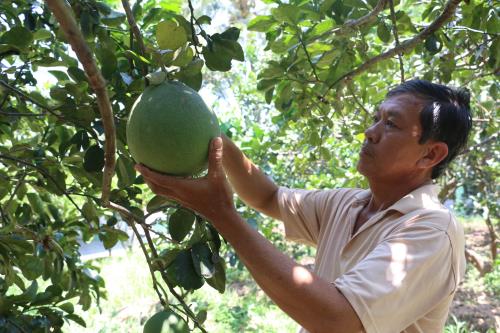 Society
Society

Authorities in the Cửu Long (Mekong) Delta province of Bến Tre have encouraged farmers to co-operate among themselves and with companies to improve farming efficiency.

|
| Green skin and pink flesh grapefruit grown in Bến Tre Province. — VNA/VNS Photo Huỳnh Phúc Hậu |
BẾN TRE – Authorities in the Cửu Long (Mekong) Delta province of Bến Tre have encouraged farmers to co-operate among themselves and with companies to improve farming efficiency.
Huỳnh Quang Đức, deputy director of the province’s Department of Agriculture and Rural Development, said after restructuring agriculture over the last year to adapt to climate change, the province has two main products, coconut and green skin and pink flesh grapefruit, which are resistant to climate change and have steady demand.
Farmers in Bến Tre, the country’s largest coconut producer, have chosen it as one of the key crops to restructure their production since the tree is resistant to drought and saltwater intrusion.
Since the province is on the coast, it is one of the hardest hit in the delta by saltwater intrusion from the sea through rivers in the dry season.
To cope, many rice farmers here have switched to other crops like coconut and green skin and pink flesh grapefruit. They have tied up with companies to ensure steady demand for their produce and incomes.
Nguyễn Văn Hưng has an 8,000sq.m coconut grove in Giồng Trôm District’s Châu Bình Commune and a contract with the Ba Đốt Coconut Co., Ltd in Châu Thành District.
He used to grow rice, but after the severe drought and saltwater intrusion in 2015 – 16 he switched to other crops, but could not earn much.
Early last year he began to grow xiêm xanh coconut, a variety grown for its juice.
The company provides seedlings and teaches him organic farming techniques.
“I have signed a farm contract with the company, so I feel secure,” he said.
Trần Văn Phong, director of Ba Đốt, said his company had signed contracts to buy coconut grown on more than 70ha, including 40ha of new groves.
It plans to sign up more coconut farmers, especially those who switch from other crops.
Bến Tre has more than 72,000ha under coconuts, including 20,000ha of xiêm xanh coconut.
Võ Văn Nam, head of the province’s Plant Protection and Cultivation Sub-department, said farmers had recognised the usefulness of tying up with companies and were gradually switching to crops that have market demand.
"The co-operation helps improve incomes and adapt to climate change," he said.
Đức added that to restructure agriculture to adapt to climate change and meet market demand, it was important that authorities properly organise agriculture and teach farmers appropriate techniques. — VNS




